“Thirty seconds of this violence.”
Wanda Turner
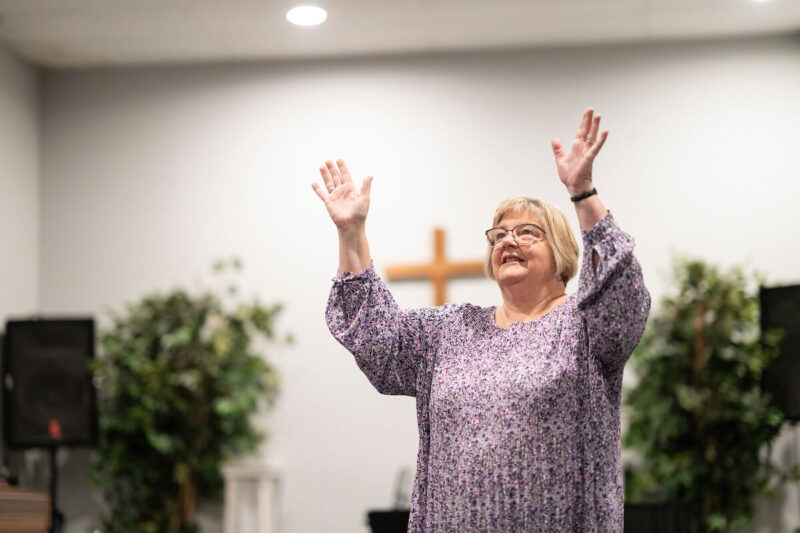
Raised near the confluence of the Thompson rivers in Kamloops, Wanda Turner grew up outdoors—hiking, biking and skiing. Her own sizable nuclear family—she’s the eldest of four children—melded with a huge extended family that kept her youth filled with love and security.
“They may have lived out of town but boy, there was always somebody visiting,” says Wanda. “I look back and I think I had the best childhood in the universe.”
For twenty-five years, she worked as a registered nurse in cities across British Columbia and Alberta. Wanda then spent another fifteen years as a homemaker, raising her two sons and taking them on road trips through the Rockies. She is a woman of faith—“a wonderfully and fearfully made creation of God”—and attends church regularly. She now lives in a senior-oriented condo in Chilliwack and acts as the strata’s president. At the time the atmospheric rivers hit southern BC, Wanda was returning home with a neighbour from a long-weekend trip to Kelowna.
She was almost home when a landslide hit her car.
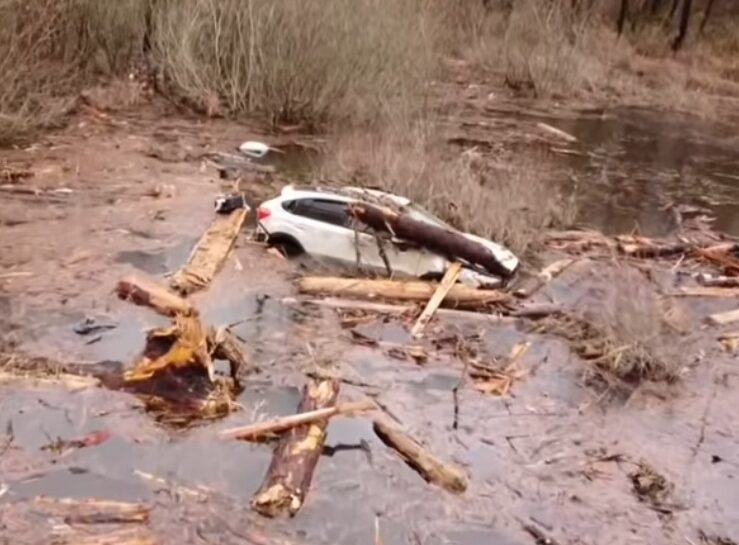
Wanda Turner was driving back to Chilliwack, Canada in 2021 when a landslide hit her car. (CDP Photo/Wanda Turner)
It rained in Kelowna all night on Saturday. It was ridiculous. It was over the top. On Sunday morning, I check the webcams. There was no snow. I was like “Wow, it’s still warm,” instead of thinking, “That is so wrong. That does not make any sense at all, in November, to have rain that heavy.” If I had seen 500 millimetres of rain, I might not have gone.
I knew the roads: just go to Aspen Grove, then down to Princeton, Manning Park, then Hope, home. We started kind of late, 1:00 in the afternoon, so it was getting dark when we were at Princeton. Everybody and their dog was going back to Vancouver. So we went on this very crowded road all the way through Manning Park with these waterfalls coming down. I was thinking, “When is this road going to wash out?”
Our usual three hour trip already turned into six hours long. When we drove through Hope at 6 p.m., the power was out. I just thought, “We got two more big bridges” over the mighty Fraser, which is going to be fully loaded with water. I don’t like going over bridges during flood time.
We were driving in the dark, west on Highway 7. We were almost home. One more bridge to go, thirty minutes from Chilliwack. Excess water released a portion of a mountain. A huge scar of rock and trees and water fell down from above.
I saw an angry tidal wave coming toward the car’s passenger side. Then the impact, throwing the vehicle across the centreline. Right off the highway into the great unknown. There were a lot of very loud bangs. Felt like throwing the car from side to side, as if in a cement tunnel. On one side: bang! We’re hitting trees. Bang!
Thirty seconds of this violence. Rushing water through a stand of cottonwoods, followed by a logjam. We came to a stop. Dirty water dripping off my companion and myself. It was pitch black. I had no idea what we had just been riding. I had no idea where the Fraser River was, except we’re probably close to it. The thought that we were being swept into it overcame me. I thought we should immediately prepare to get out of the car and be engulfed by the current. My first words after “Lord save us,” was, “Put down your windows, were going to have to swim!”
It took an hour of shock and trembling to finally move out of my car seat. The water was slowly filling up the car. We went to sit on top. We could hear others occasionally calling for help.
I found my phone. It was wet, but with all these great covers, everything worked. I called 911. Then called family and friends. Just a quick call. I phoned my sons. One phoned me back and said he was going to call me every half hour once he figured out what was happening up in Kelowna. I said “You can’t phone me every half an hour. I have no more battery power.”
My companion with me had a phone that worked for a long time. The kids in the cars not far from us had their phones. They all called back 911 and spoke for a long time with them. “When are you coming? When are you going to be here?” “Two to three hours,” they said, “We’ve sent somebody out.” They were co-ordinating with the locals that could still get there because so many roads were not working.
Suddenly I saw a big light and thought it was something set up for checking the train tracks. Then I saw little flashlights going up and down and coming closer. I realized people going up and down the landslide debris between us and the road. The landslide washed me off the road approximately 300-metres into a drainage pond.
We were rescued at 1 o’clock in the morning. The first responders were young men from the Agassiz volunteer fire department. We balanced over giant logs, huge rocks and mud debris. I was elated, supercharged with adrenaline that helped me navigate a “Tough Mudder.” I’ve seen Tough Mudders. I wasn’t actually in one before until then.
Five of us were taken in a minivan to Chilliwack hospital. It just happened to be quiet in the ER. We had great care. I had no injuries except for a sore arm and lots of bruises. I went home to sleep for twelve hours.
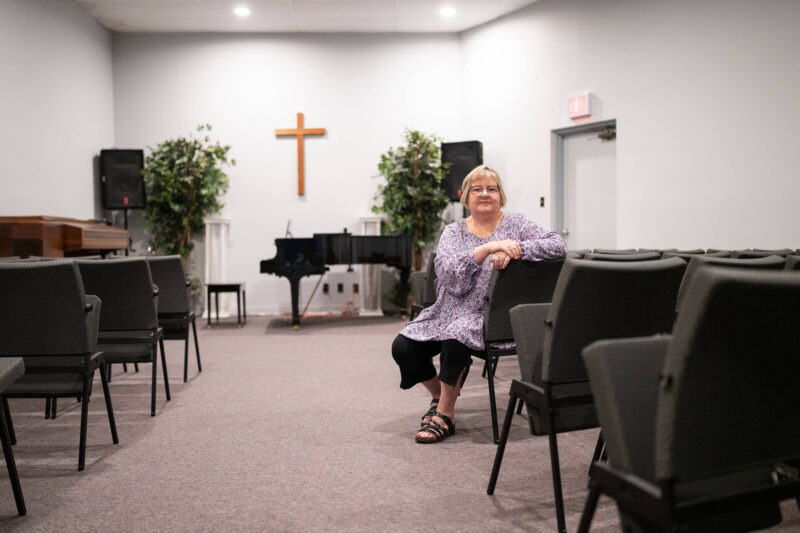
“My first words after ‘Lord save us,’ was, ‘Put down your windows, were going to have to swim!'” (CDP Photo/Jim Jeong)
I woke up and had to deal immediately with a building disaster. The same disastrous rainfall flooded the elevator pit in my condo. I was working my unpaid job as property manager. Chilliwack became an island. There was nowhere to go. If you’d go down the road, there’d be a barrier because it’s flooded. I had to problem-solve about what to do because we couldn’t use the elevator. The local elevator serviceman, fire protection companies, hydro-vac service, and plumbers had to be called by me to remedy the situation.
We became friendly as we worked together. We had nicknames for each other. I was called, “Washed Out Wanda.” The elevator guy was called, “Pit-Stop Pete.” What we were living through was being processed by us all and we were in shock. We were giddy, even jovial. It seemed surreal, knowing that we were landlocked, and the major highway was underwater, crippling the whole province.
People do bond in a crisis. I came to a deeper friendship with the neighbour that I went through the landslide with: she and I get together more often to talk about what happened. We share pictures and videos to process the event. We were needing a post-traumatic stress debriefing. I made myself go through that. I thought, “Okay, I’m gonna need counselling for this.”
I wanted to positively process the traumatic memory of the events. I learned about who was responsible for the emergency rescue service. I especially want to thank the Agassiz volunteer firemen and make a donation to their emergency program. I wrote thank you letters to the BC premier, who I wasn’t particularly fond of. But when you’re sitting there after having that near-death experience, I was grateful for the fast rescue. The BC rescue emergency service was fantastic. They just had that two days of hell and they found us in six hours. It seems so quick now.
I went to church more regularly. I joined a small group for sharing and had regular prayer time. My relationship with my family deepened. With almost dying, we all appreciate each other so much more.
This testimony was originally published in the Fraser Valley Current, on January 17, 2023.
Related Stories
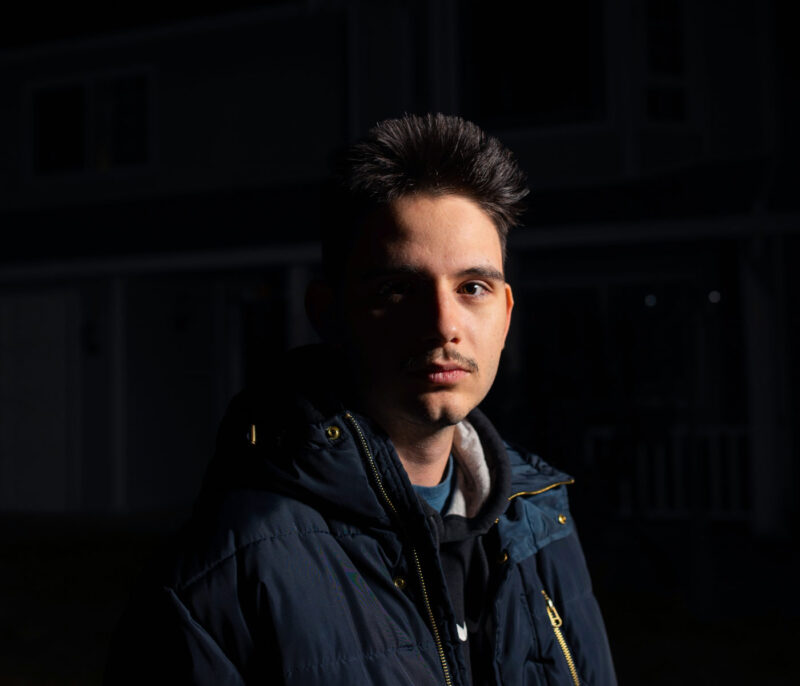
Brian Mirea, Abbotsford, Canada
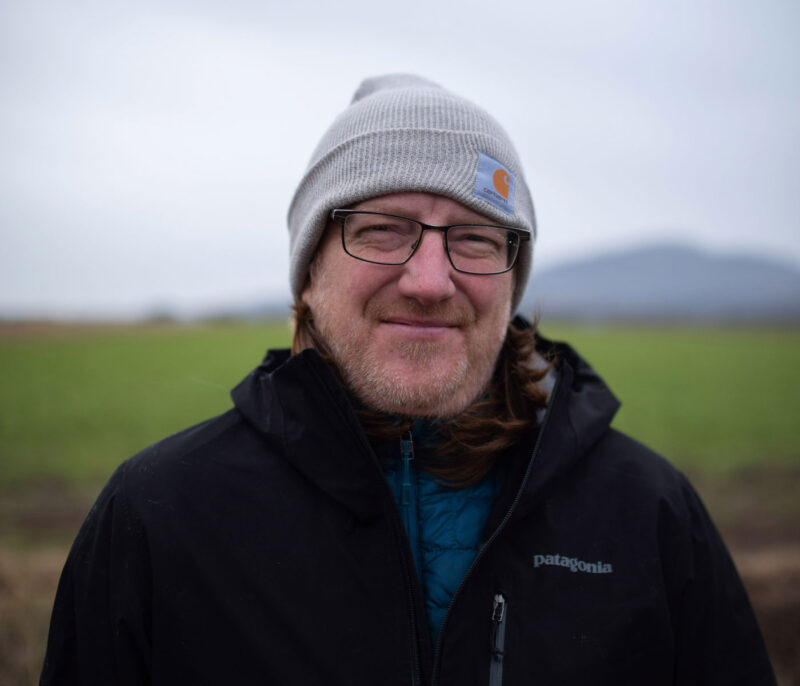
Jordi Williams, Chilliwack, Canada
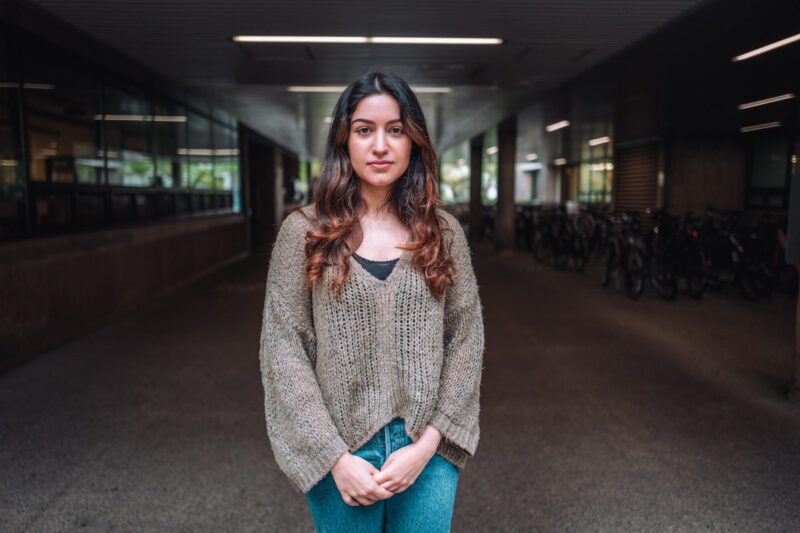
Sarah Suleman, Victoria, Canada